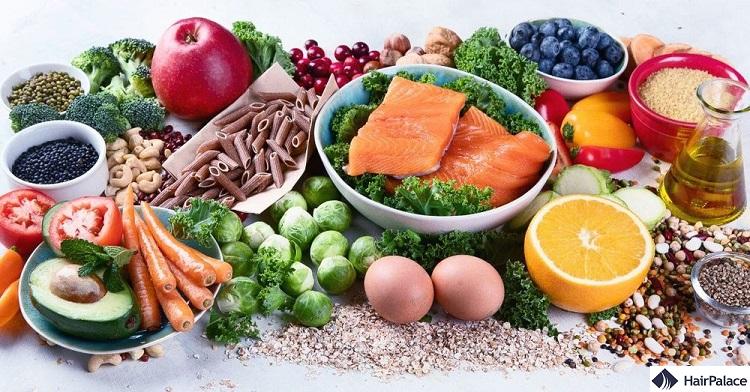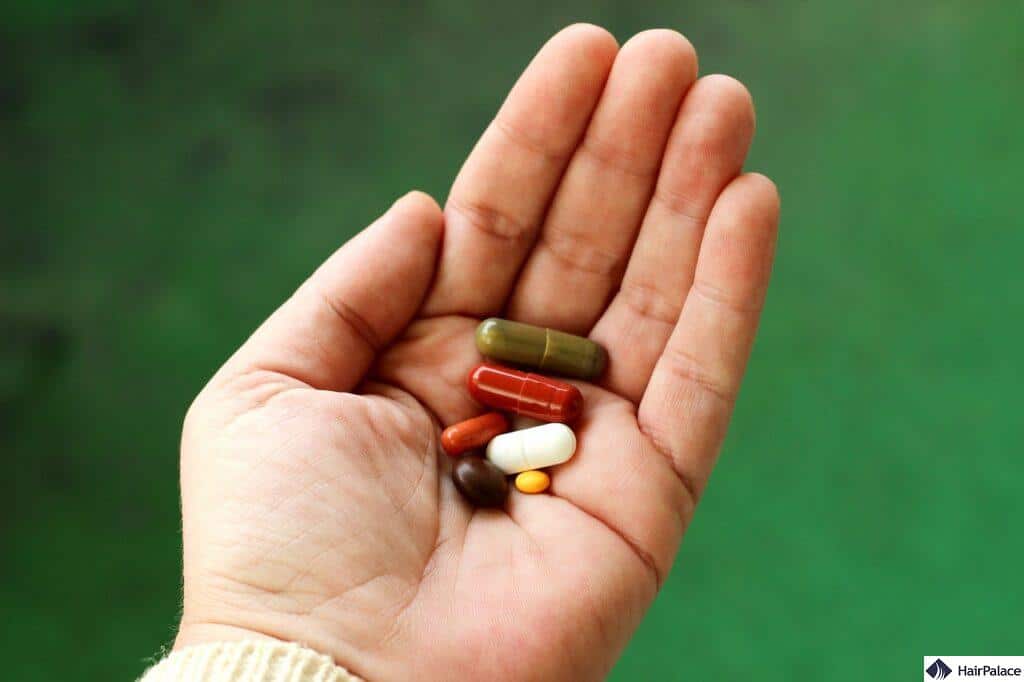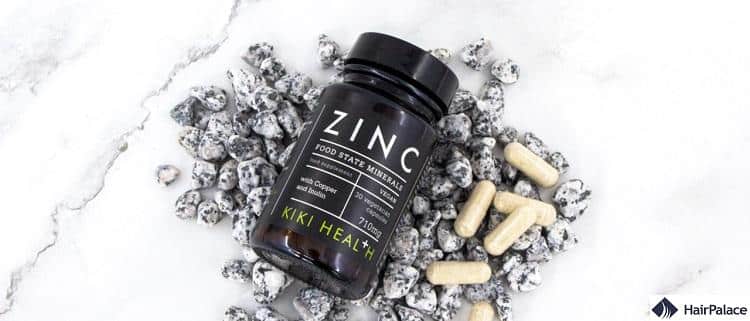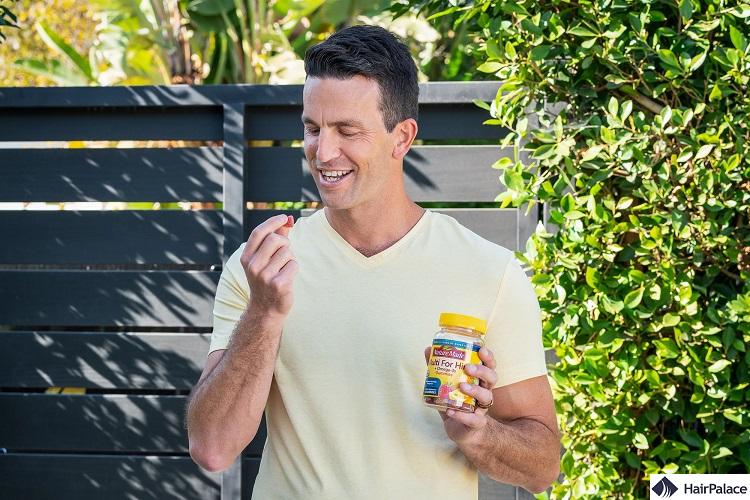Which Vitamin Deficiency Causes Hair Loss? 15 Most Common

Hair loss is one of the most widespread conditions faced around the world.
And while many people think it’s a result of growing old, genetics, and an overlooked cause is vitamin deficiencies.
Vitamin D, biotin (vitamin B7), iron, vitamin B12, and zinc are essential for hair follicle health, keratin production, oxygen transport, and cell division.
Lack of these vitamins and minerals can lead to hair thinning, brittleness, and significant shedding.
This article will explain everything you need to know about vitamins for hair health and their relationship with hair loss.
We’ll highlight which vitamin deficiency causes hair loss and suggest easy ways of improving your intake.
We’ll also share some of the best treatment options proven to help protect hair and hopefully prevent future hair loss.
The 15 most common vitamin deficiencies that cause hair loss
1. Vitamin B12 deficiency and hair loss
A common vitamin deficiency that causes hair loss is connected to a lack of vitamin B12.
B12 is crucial for producing healthy red blood cells that supply oxygen and nutrients to hair follicles, supporting both new hair growth and the maintenance of existing hair, skin, and nails.
Additionally, it regulates amino acid metabolism, essential for producing keratin, the protein that makes up hair.
Symptoms of B12 deficiency include light-headedness, heart palpitations, diarrhoea, fatigue, and skin issues like inflammation and itching, all of which can damage hair follicles and diminish hair quality.
Vitamin B12 is naturally found in animal-based foods. These include meat (especially liver and kidney), fish, shellfish, dairy products, and eggs.
2. Folic acid deficiency and hair loss
Can folate deficiency cause hair loss?
Folic acid, also known as folate or Vitamin B9, is crucial for healthy hair growth by promoting new cell formation in hair follicles and increasing keratin production for thicker hair.
A deficiency can lead to megaloblastic anaemia, where malformed red blood cells limit oxygen and nutrient supply to hair follicles, resulting in folic acid deficiency hair loss.
Symptoms of folic acid deficiency include extreme fatigue, weakness, shortness of breath, and reduced keratin levels, all of which contribute to stunted hair growth and diminished hair quality.
3. Biotin deficiency and hair loss

Biotin, also known as Vitamin B7 or Vitamin H, is essential for maintaining healthy hair, skin, and nails by aiding in the metabolism of amino acids, which are vital for hair health.
As a water-soluble vitamin, the body does not store biotin, making regular intake important.
A deficiency can lead to symptoms such as dry, scaly skin, inflammation, brittle nails, and weak, easily breakable hair.
Most people obtain sufficient biotin through a balanced diet, but deficiencies may occur due to poor nutrition or conditions like Crohn’s disease that impair biotin absorption.
If you suspect a biotin deficiency, consult a doctor for dietary adjustments or appropriate supplements to restore adequate biotin levels.
4. Riboflavin deficiency and hair loss
Riboflavin, also known as Vitamin B2, is essential for energy production within cells, protecting the body from free radicals, and promoting new growth.
A deficiency in riboflavin can lead to ariboflavinosis, which is associated with hair loss because hair follicles lack the necessary nutrients and are damaged by free radicals.
Riboflavin-rich foods include leafy green vegetables, milk, fortified cereals, and eggs. Most individuals obtain sufficient riboflavin through a balanced and varied diet.
5. Vitamin D deficiency and hair loss
Vitamin D is crucial for regulating the hair growth cycle by ensuring that new hair strands develop after shedding.
A deficiency in vitamin D can hinder hair follicles from restarting the growth cycle, leading to hair loss.
Many people have low vitamin D levels, especially those living in areas with limited sunlight, during the winter months, or with diets lacking vitamin D-rich foods.
Supplementing with vitamin D can effectively increase levels and potentially improve hair health.
Ensuring adequate vitamin D intake through diet or supplements is important for maintaining healthy hair growth.
6. Zinc deficiency and hair loss

Zinc is a crucial trace mineral that supports essential bodily functions such as cell growth, wound healing, and a healthy immune system.
It plays a significant role in maintaining healthy hair by regulating sebum production, which keeps hair moisturized and prevents it from becoming too dry or oily.
Insufficient zinc levels can lead to issues like dandruff, folliculitis, and skin irritation.
Additionally, low zinc weakens the immune system, increasing the risk of infections and adversely affecting hair quality.
Although only small amounts of zinc are needed, deficiencies are common, often due to an unbalanced diet or medical conditions that hinder zinc absorption.
Ensuring adequate zinc intake is important for overall hair health and well-being.
7. Selenium deficiency and hair loss
Selenium is an essential trace mineral that supports healthy hair growth by regulating thyroid hormones through the production of selenoproteins.
These hormones are crucial for hair development, and a deficiency can lead to stunted hair growth.
Additionally, selenium possesses antioxidant and anti-inflammatory properties, protecting hair and skin from free radical damage and creating an optimal environment for hair to thrive.
While selenium can be obtained from sources like nuts, whole grains, and seafood, it’s important to consume it in moderation.
Excessive selenium intake can cause adverse effects, including hair loss, making it essential to maintain a balanced intake for optimal hair health.
8. Iron deficiency (anemia)

Iron is vital for maintaining overall health, as it is used to produce haemoglobin, the protein that carries oxygen in red blood cells.
It plays a key role in collagen synthesis, which ensures skin strength and elasticity.
An iron deficiency significantly impacts hair health by reducing the oxygen supply to hair follicles, leading to restricted growth and making hair strands weak and brittle.
Additionally, low iron levels can weaken the immune system, increasing the risk of infections and illnesses.
Symptoms of iron deficiency include extreme fatigue, cold hands and feet, pale skin, and headaches.
To combat iron deficiency, it is important to consume a nutrient-rich diet that includes dark green vegetables like spinach and broccoli.
9. Vitamin C deficiency
Vitamin C is vital for improving blood circulation, boosting the immune system, and protecting hair follicles from free radical damage with its antioxidant properties.
It is abundant in foods such as citrus fruits, orange juice, leafy greens, strawberries, and kiwi.
Although vitamin C deficiency is rare in developed countries, it can lead to scurvy, which causes hair loss, thinning, and splitting.
To maintain healthy hair, ensure adequate intake of vitamin C through a balanced diet or consider supplements if necessary.
10. Vitamin A
Vitamin A deficiency can cause hair loss by disrupting the production of sebum, an oil that moisturizes the scalp and keeps hair healthy.
Without sufficient Vitamin A, the scalp becomes dry, leading to brittle hair that is more prone to breakage and increased shedding.
Additionally, Vitamin A is essential for cell growth and the regeneration of hair follicles, so a deficiency can impair growth and maintenance.
Symptoms of Vitamin A deficiency include dry skin, weakened immune function, and vision problems.
To prevent hair loss related to Vitamin A deficiency, it is important to consume adequate amounts of Vitamin A through foods such as carrots, sweet potatoes, and leafy green vegetables, or consider taking supplements if necessary.
11. Vitamin E deficiency
Vitamin E deficiency negatively impacts hair health by reducing the scalp’s ability to protect hair follicles from oxidative stress and free radical damage.
As a powerful antioxidant, Vitamin E helps maintain healthy hair and prevents hair from becoming dry and brittle.
A lack of Vitamin E may lead to increased hair loss, thinning, and a dull appearance.
Additionally, insufficient Vitamin E can impair blood circulation to the scalp, further hindering hair follicle function and growth.
Common sources of Vitamin E include nuts, seeds, spinach, broccoli, and vegetable oils.
To prevent deficiency and promote healthy hair, it is important to include these foods in your diet or consider taking Vitamin E supplements if necessary.
12. Vitamin B6
Vitamin B6, also known as pyridoxine, is essential for maintaining healthy hair.
It plays a key role in the production of haemoglobin, which transports oxygen to hair follicles, and in the metabolism of amino acids, which are necessary for keratin production.
Vitamin B6 deficiency symptoms include hair thinning, hair loss, or brittle hair as hair follicles receive inadequate oxygen and nutrients.
Additionally, Vitamin B6 helps regulate hormone levels, which can influence hair growth and prevent conditions like dandruff and seborrheic dermatitis.
Good sources of Vitamin B6 include poultry, fish, potatoes, chickpeas, bananas, and fortified cereals.
13. Niacin (Vitamin b3)
Niacin, also known as Vitamin B3, maintains healthy hair by promoting proper blood circulation to the scalp.
This ensures that hair follicles receive adequate oxygen and nutrients for growth.
It helps in the synthesis of keratin, the protein that makes up hair, thereby supporting strong and resilient strands.
A niacin deficiency can lead to symptoms such as hair thinning, increased hair loss, and a dry, flaky scalp.
Additionally, niacin helps reduce inflammation and can improve overall scalp health, creating an optimal environment for hair growth.
Dietary sources of niacin include poultry, fish, whole grains, nuts, and legumes.
14. Amino acid
Amino acids are the building blocks of proteins, including keratin, which is essential for strong and healthy hair.
They play a crucial role in hair growth and repair by providing the necessary components for hair follicle cells to function properly.
Essential amino acids, such as lysine and methionine, are particularly important for preventing hair loss and promoting thickness.
Additionally, amino acids aid in the absorption of other nutrients that contribute to hair health, such as vitamins and minerals.
A deficiency in amino acids can lead to weak, brittle hair, increased shedding, and slowed hair growth.
To ensure adequate intake, include protein-rich foods like lean meats, fish, eggs, dairy products, legumes, and nuts in your diet.
15. Essential fatty acids
Essential fatty acids play a crucial role in maintaining healthy hair by supporting cell membrane integrity, promoting scalp health, and providing the necessary oils that keep hair moisturized.
Omega-3 and Omega-6 fatty acids, the primary types of essential fatty acids, help reduce inflammation, which can prevent hair loss and encourage growth.
Additionally, they nourish hair follicles, improve blood circulation to the scalp, and add shine and elasticity to hair strands.
A deficiency in essential fatty acids can lead to dry, brittle hair, increased hair shedding, and a dull appearance.
Good dietary sources of essential fatty acids include fish (such as salmon and mackerel), flaxseeds, chia seeds, walnuts, and vegetable oils like flaxseed oil and sunflower oil.
How to treat a vitamin deficiency through dietary supplements?

Dietary supplements can be an effective way of addressing any vitamin deficiencies you have.
These supplements can help increase your daily intake quickly and easily, and restore hair growth to optimal levels.
That said, you must first know which vitamin or mineral you lack.
That’s why it is highly recommended that you go to your doctor, who can run some diagnostic tests, like blood tests, for concrete results.
Once identified, your doctor can suggest various treatments, including high-quality supplements, to reverse your vitamin deficiency.
These can come in tablet, capsule, or gummy form and are widely available in most online retailers, health shops, and pharmacies.
That said, you should not rely totally on supplements to increase your vitamin count.
Eating a healthy, varied diet is one of the best ways to improve your general health and well-being and ensure your hair is well-supported.
Concentrate on eating more fruits, vegetables, dairy products, whole grains, and lean protein, and eliminate processed fats from your diet.
Five excellent ways to treat hair loss
If fixing the deficiency didn’t improve your condition, there are still various ways to address your hair loss.
The five best ways to correct vitamin deficiency hair loss include:
1. Medications
While there are a variety of different medications that claim to treat hair loss, two of the most popular and effective are minoxidil and finasteride.
Minoxidil, also known as Rogaine, is an over-the-counter, topical solution applied directly onto your scalp to help extend the growing phase of hair.
Finasteride blocks hormones like testosterone from changing into dihydrotestosterone (DHT), a sex hormone known to shrink hair follicles and cause hair loss.
2. Hair transplant surgery
Hair transplant surgery is an innovative hair loss treatment that can permanently correct hair loss.
Simply put, a highly skilled surgeon will extract hair from a dense part of your head and transplant it strategically into balding areas.
It can be incredibly effective in correcting even extensive hair loss.
3. Platelet-rich plasma (PRP) therapy
PRP therapy is another cutting-edge treatment that uses your platelets’ power and healing properties to promote hair growth.
Injected into areas experiencing hair loss, these platelets stimulate new hair follicles and trigger improved growth.
4. Low-level laser therapy (LLLT)
LLLT is an innovative way to help heal hair follicles and stimulate and sustain new hair growth.
A device emits a low-level laser light on damaged hair, which is thought to help make strands thicker and stronger.
5. Lifestyle changes
Making small changes to your lifestyle can help address some of the most common causes of hair loss, including poor diet, high-stress levels, and harsh chemical treatments.
Try to eat a balanced diet rich in nutrients and vitamins, and manage your stress levels by enjoying some gentle exercise.
FAQ
Hair loss from vitamins usually happens due to excess intake, not deficiency. Too much vitamin A is the most common culprit, as it can push hair follicles into a resting phase. Very high doses of selenium can also contribute to shedding. Balanced amounts are safe, so hair loss from vitamins is generally linked to over-supplementation.
Last medically reviewed on September 25th, 2025
- Almohanna HM, Ahmed AA, Tsatalis JP, Tosti A. The role of vitamins and minerals in hair loss: a review. Dermatology and therapy. 2019 Mar;9(1):51-70.https://doi.org/10.1007/s13555-018-0278-6
- Rushton DH. Nutritional factors and hair loss. Clinical and experimental dermatology. 2002 Jul 1;27(5):396-404.https://doi.org/10.1046/j.1365-2230.2002.01076.x
- Guo EL, Katta R. Diet and hair loss: effects of nutrient deficiency and supplement use. Dermatol Pract Concept. 2017 Jan 31;7(1):1-10.https://doi.org/10.5826/dpc.0701a01
- Patel DP, Swink SM, Castelo-Soccio L. A Review of the Use of Biotin for Hair Loss. Skin Appendage Disord. 2017 Aug;3(3):166-169. https://doi.org/10.1159/000462981
- Saini K, Mysore V. Role of vitamin D in hair loss: a short review. Journal of cosmetic dermatology. 2021 Nov;20(11):3407-14.https://doi.org/10.1111/jocd.14421


